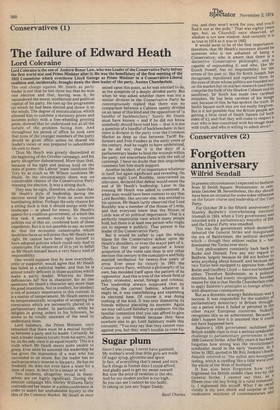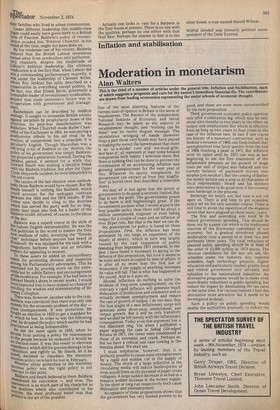Conservatives (2)
Forgotten anniversary
Wilfrid Sendall
In present circumstances I expected no fanfares from 32 Smith Square, Westminster, to cele
brate October 29. Nevertheless, the day should have been an occasion for some sober reflection on the future course and leadership of the TorY Party.
For October 29 is the fiftieth anniversary Stanley Baldwin's overwhelming electoral triumph in 1924, when a Tory government was returned with a parliamentary majority of 224, and the Liberal Party was smashed.
This was the government which decisivelY defeated the General Strike and inaugurated the era of Baldwinism, the political doctrine which — though they seldom realise it — has dominated the Tories ever since.
Tory philosophers constantly hark back to Burke and Disraeli. Few pay any regard to Baldwin, largely because he did not bother to write anything about himself, and because the two Tories best equipped to appraise him—Rab Butler and Geoffrey Lloyd — have not bothered either. Therefore Baldwinism, as a political doctrine, has had scanty recognition. Another
reason for this is that Neville Chamberlain tried to apply Baldwin's principles to foreign affairs, with disastrous consequences. But as a domestic strategy Baldwinism was ar success. It was responsible for the stability 01 parliamentary democracy in Britain through
out a period when it failed or perished in the other major European countries. NoboclY recognises this as an achievement. Because it didn't happen here it is assumed that it could not have happened here.
Baldwin's 1924 government mobilised the British middle class to rout a serious syndicalist challenge to parliamentary government in the 1926 General Strike. After fifty years it has been forgotten how strong was the revolutionary syndicalist mood in the early 'twenties. In a letter in 1922, quoted in Mr Roy Jenkins's boog. Asquith referred to "the sullen anti-bourgeois feeling, which is swelling like a tidal wave over the whole of the West of Scotland." It has also been forgotten how very frightened the British middle class was by the
General Strike. I cannot say that, as a fifteen-year-old boy living in a rural cornmunl; ty, I registered this myself. What I do recall vividly is my own shock and surprise at the vindicative reactions of contemporaries and their families who lived in urban communities. Under different leadership this middle-class fright could easily have given birth to a British form of Fascism. Baldwin's policy of reconciliation avoided this. Winston Churchill, in his mood at the time, might not have done so. By his moderate use of his victory, Baldwin ensured that the British Labour movement turned away from syndicalism into parliamentary channels, despite the ineptitude of Labour's political leadership. His ultimate vindication is in the fact that, when Labour did win a commanding parliamentary majority, it was under the leadership of Clement Attlee, Whom Roy Jenkins has aptly described as a conservative in everything except politics. In the fact, too, that Ernest Bevin, potentially a formidable leader of revolutionary syndicalism, decided that trade unionism's future was in cooperation with government and management.
Baldwinism can be described by medical analogy. It sought to immunise British society
• against socialism by prophylactic doses of the infection. Its post-war manifestation was Butlerism. When Churchill made Butler Chancellor of the Exchequer in 1951, he was paying a Posthumous tribute to his old rival. In its erection of compromise into a principle, it is Peculiarly English. Though Macmillan was a left-wing critic of Baldwin in the 'thirties, the Policy of his government was simply BaldwinSi!) projected a generation forward. During the Selsdon period, it seemed for a while that Edward Heath was making a decisive break With the Bladwin tradition, but after the Upper Clyde Shipyards incident, he reverted quickly to the old course. The tactics of the last election were undoubtedly those Baldwin would have chosen. But Mr Heath himself is nothing like Baldwin, which could account for the unhappy contrast betWeen the 1924 and the 1974 results. If the Tories now decide to cling to the doctrine Which has served the party well for so long, srsurelY they must also look for a leader of the zaldwin model, adjusted, of course, to the idiom of the day.
„Baldwin was a superb orator in the style of
e lushest English sentimentality. He was the iirst politician in the world to master the then new medium of radio, inventing the "fireside Chat technique before anyone had heard of Roosevelt. He was equipped for the task with a Plagnificent baritone voice and an infallible Instinct for appealing to women. ,10 these assets he added an extraordinary `atent for promoting division and suspicion aniong his Parliamentary adversaries. This he ekercised not by pouring scorn on the extreracists but by subtle flattery and encouragement the moderates. For example, if he had been in iward Heath's shoes in recent weeks, I would 'Lave expected him to have missed no chance of ejXtolling the wisdom and statesmanship of Mr a...Ines Callaghan. e 'here was, however, another side to the coin. r aldWin was convinced that there was only one ernedy for the economic problem of the day _ ass unemployment. It was protection. He nght an election in 1923 to get a mandate for Which he lost. In order to win the following he dropped the policy which earlier he had Pr' he as being indispensible. shrle did the same again in 1935, when he to“ra,nk from putting a policy for rearmament a„tne people because he reckoned it would be e" election loser It was this resort to electoral re Pediency which did the gravest damage to his n Pntation, and rightly so. Mr Heath, let it be in°ted, declined to repudiate the statutory carries policy on which he lost in February. in whether either protection or the statutory reci ernes policy was the right policy is not evant to this point. abaaldwin and Heath believed in them. Baldwin andoned his conviction — and won. The Voeuvre is as much part of his character as qualities which also contributed to his „„c,.cess. His most profound belief was that Politics is the art of the possible.
Actually one looks in vain for a Baldwin in the Tory house at present. There is no one with the qualities, perhaps no one either with that fatal flaw. Perhaps the nearest to him is in the other house, a man named Harold Wilson.
Wilfrid Sendall was formerly political correspondent of the Daily Express



































 Previous page
Previous page